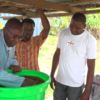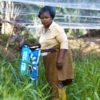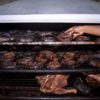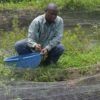AQUACULTURE VALUE CHAIN PROJECT
The fisheries sector is one of the most important sectors in Nigeria, both from an economic and social standpoint. This sector supports about 7 million people (directly and indirectly) and contributes to the livelihood, employment, and household food security of Nigeria’s coastal communities, including the Niger Delta. In the Niger Delta, the fisheries sector is of utmost importance to particularly small-scale fish farmers which make up about 80% of the sector, supplying roughly 82% of the country’s domestic fish production. In spite of the large number of fish farmers available, the demand for fish far outweighs production and is far from being satisfied either through imports or domestic production.
This sector is plagued by a host of systemic constraints which impede market growth and affect the level of productivity and income of fish farmers. These constraints are identified to be high cost of imported feed and insufficient supply of locally manufactured feed into the region; lack of quality, cost-effective, local fish feed and shortage of quality, fast-growing fingerlings and brood stock; poor infrastructural facilities within hatcheries and grow-out farms and poor knowledge of best practice in pond management which hampers productivity and profitability; poor coordination between value chain actors and lack of access to new technology and markets; and inadequate and inaccessible government extension service.
PIND initiated the Aquaculture Value Chain Project to address these constraints, stimulate considerable growth and improve the efficiency of the aquaculture sector.
To enable the fish farmers and processors in the sector who were limited by poor technical and business capacities – to increase their yield, earn more income and employ more persons.
PIND partnered with aquaculture service providers (ASPs) and input companies to help fish farmers and processors to:
- Gain knowledge of and apply best fish farming practices and business skills
- Access quality and affordable fish feed; efficient fish smoking technologies in rural and urban areas; quality fingerlings from hatcheries; and working capital and new markets

Barrister Peter Ememu

Mrs. Oluwafunmilayo Ajayi

Mrs. Vivian Dada, a fish smoker (Warri)

Mr Ogundolire Akinyemi Charles

Barrister Peter Ememu

Mrs. Oluwafunmilayo Ajayi

Mrs. Vivian Dada, a fish smoker (Warri)




Good morning mam/sir
I’m really impressed by the testimonial coming from your students who partake in your various program projects..
Please I’m interested in learning about aquaculture and it’s requirements
I’ll be glad if I’ll get a response